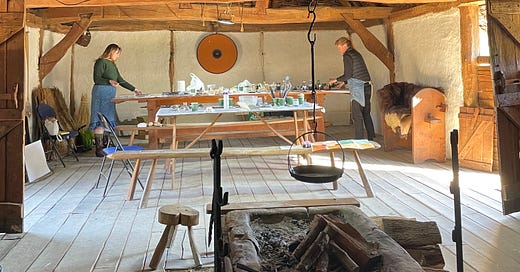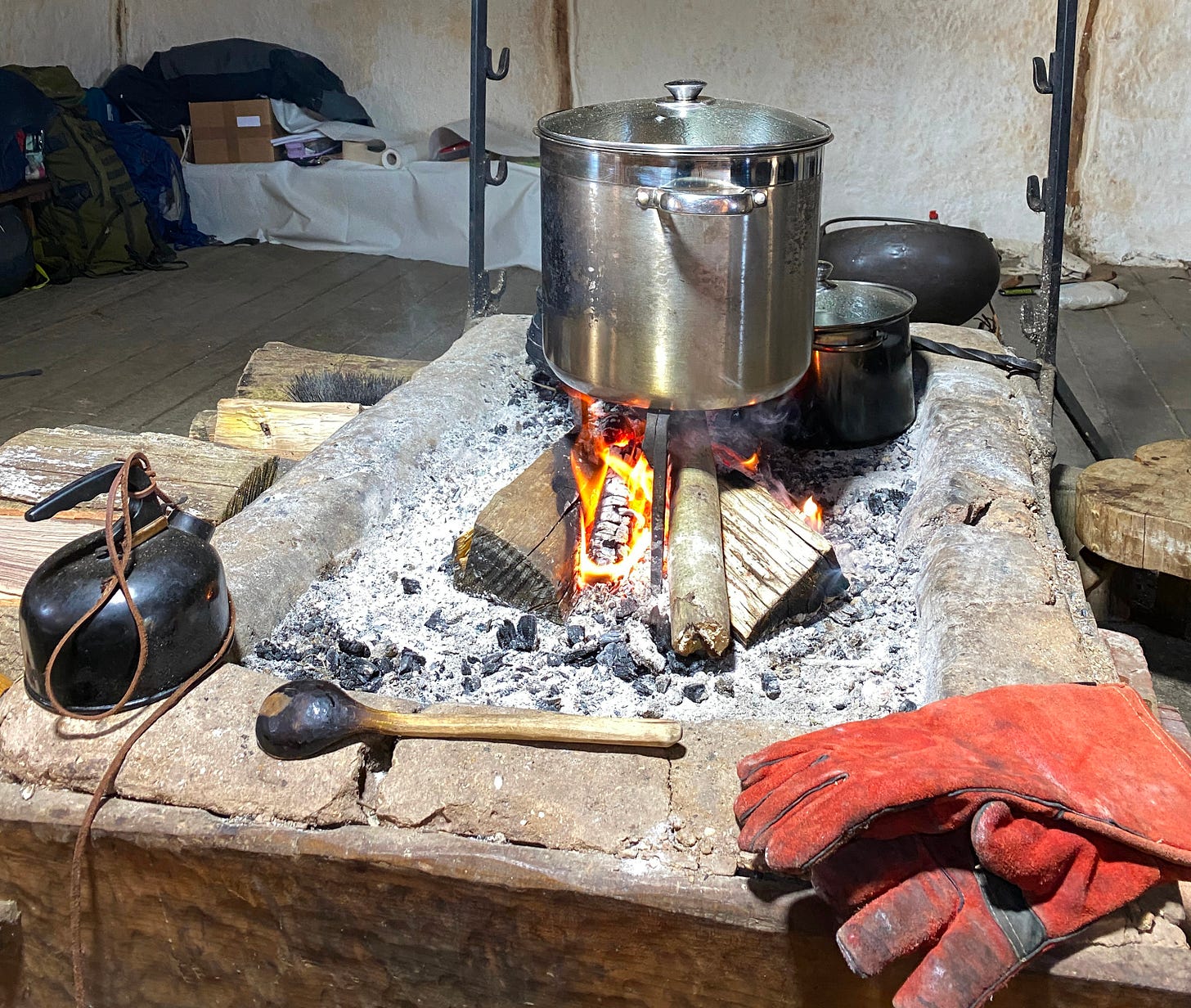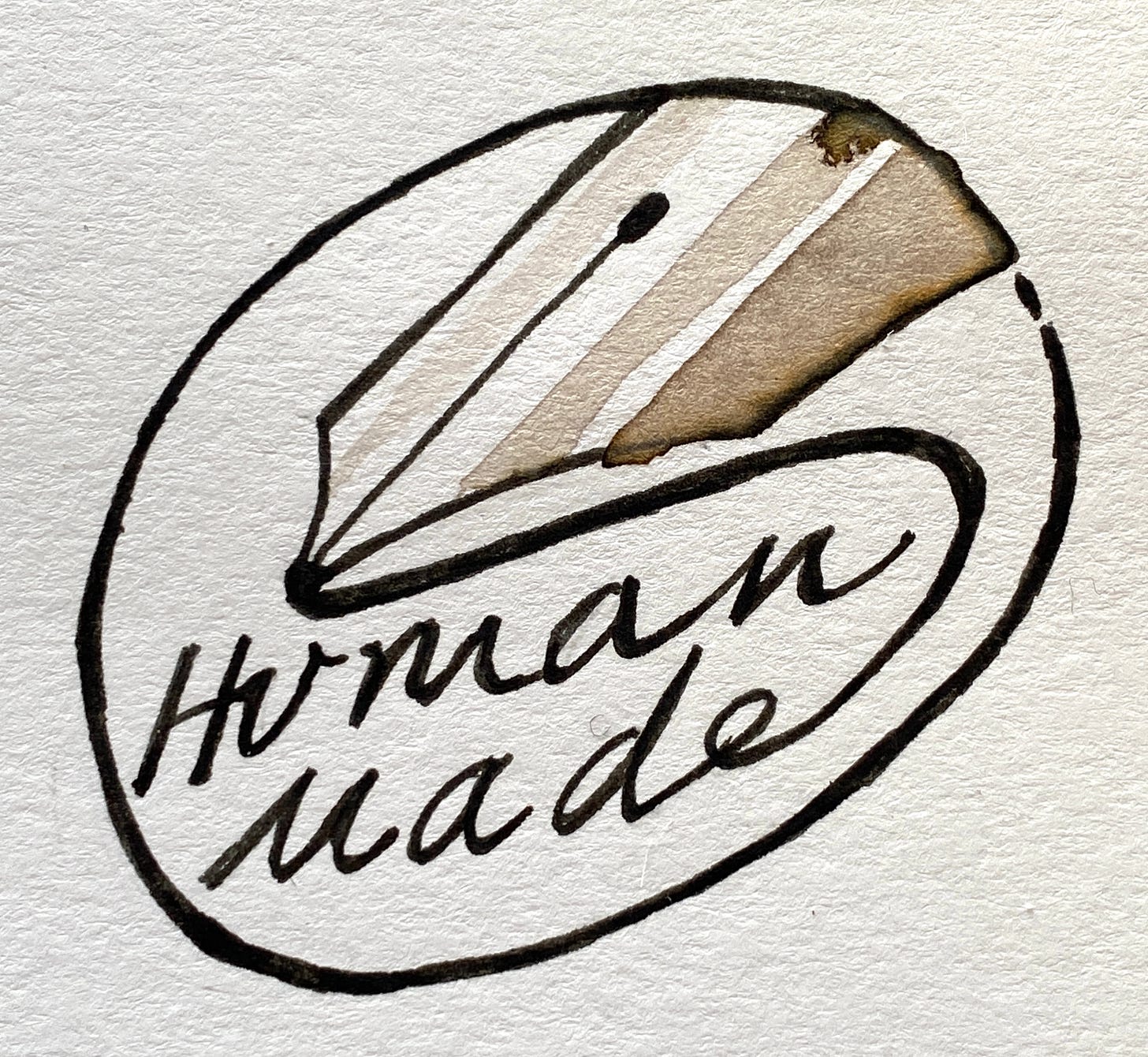Some things that seem to be dead can haunt an unwitting culture or even possess it. A way of life as old and long-lived as feudalism, which persisted in diverse forms for centuries in Europe and Japan, and millennia in China, amongst other places, rears its head this week. While it’s fresh, I’d like to share it. I am late posting, as I have been away where there is no electricity or phone signal with my siblings.
The invitation
Ten of us were sitting around the hearth fire last week, in a lovingly-built replica Saxon house, based on one excavated nearby. Conversation was flowing, a few people were sipping ale, the rest of us happy with water. Laughter erupted every few minutes as an appreciation for the stories we were telling from our different experiences of life in teaching, in the outdoors, the wild, or in the anachronistic practices found in bushcraft, re-enactment, experimental archaeology or ancient crafts. The raised central earthen hearth we gathered around was built inside a wooden box, well insulated against charring by pale clay daub. This ingenious design allowed cooking for the course to take place without my back breaking or my lungs filling quite so much with smoke, and though it was in no way as easy as using a cast iron Victorian cooking stove, (in my opinion and experience, still the peak of real fire cooking), I was glad of the Saxon innovation over the five days my life circled it.1 I have catered for the same course over an open fire on the ground, this was far more comfortable.
One thoughtful, capable, young man in his thirties, who I’ll call Lee, recounted how he had once tended a fire non-stop for a foraging and outdoors living course for two weeks, in the worst of British weather, with only a big tarp over the hearth to keep everyone, including himself, dry. His job was to rise at 5am to get the fire going, chop the wood, make sure all drinking water was boiled (as the course was ‘living wild’ not using municipal supplies), to keep the fire going all day and to cook all the meals. Knowing intimately what kind of effort, planning, strength and determination such a task requires, I asked if he had received some help, time off in the day to rest, and a good wage for his efforts.
‘There was no break,’ he said, ‘barely anybody spoke to me, even when they came to dry their boots or warm their feet around the fire as I cooked.’ His face was sad and philosophical as he said, ‘I had taken two weeks of my yearly leave and paid £250 for the privilege of being the ‘hearth person’, which in the call-out had sounded Romantic, beautiful, convivial…’ His voice trailed-off.
‘But it turned out you were treated like a servant for two weeks, a skivvy, a serf. If you had read, instead of the spiritual-bypassing-style “hearth-person”, something more honest such as, “person needed to keep a cook fire going 18 hours a day for two weeks with no pay and little social interaction, with only damp spruce timber as fuel”, you probably would not have signed up, eh?’
With a wry laugh and a nod, Lee took another swig from his water bottle. ‘Yeah… I was looking for purpose and community, but I was the only person nobody talked to, despite how essential the job was to the whole course. Also, the person who was “holding the menu” got paid.’
I couldn’t help raising my eyebrows at this next New Age job title, ‘“Holding the menu”. So, meal-planner, right?' The person with the list was paid and appreciated but the person chopping the wood and breathing in smoke wasn’t. This is an old story, Lee, and I am sorry to see the dark shadow of the British class system creeping over what should have been a fortnight of camaraderie, good wild food and shared life.’
I awoke the next morning with Lee’s story filling my mind and we talked further about his experiences over coffee break with the others. Lee is from another northern European country, though he is naturalised here and settled, with barely an accent. Where he comes from, things have been far more egalitarian for far longer than in the UK, (which in my opinion hasn’t ever broken free of its Norman yoke). We must seem strange, I thought, with our intense denial of the existence of a remaining class system, yet constant perpetuation of it in the unlikeliest of situations. We talked about how good intentions and an abundance of idealism can turn sour in organisations, communities and alternative educational set-ups, without a willingness to look at our unacknowledged tendencies to make serfs, scapegoats or dogsbodies of someone, yet be barely conscious of it happening.
Archetypes are not the only revenants
There is much apt talk right now of Tricksters2, Dictators, Faerie3, Fools, Demons and Mages, for good reason. It’s richer to look at the movement behind world events when we have archetypes and myths to help guide us. There are other less easily distinguishable shapes which surface in the psyche of the world, however, which, due to their lowly stature and unglamourous appearance, can seem almost invisible, like the beggar on the street.
Where are we not seeing the serf? I knew the organisation Lee had experienced and I know they are doing some very interesting and wholesome things in Britain. Perhaps their internal organisation has changed in the years since his time with them, so I am not going to point fingers. Having run bands, a record company, my T’ai Chi school and my teacher’s T’ai Chi school, looking back, I can see how easy it is for one person to begin to carry so much more than someone else, especially when ‘art’ or ‘spirituality’ are involved. Sometimes that person has been me. Sometimes I have not seen that this person is someone I have been taking for granted.
When I first went to study with my late Grandmaster John Kells, I instinctively made the jasmine tea at break time, and came to pour him and his top students a cup. ‘Ah, got ourselves a little serving girl, have we?’ He said, deftly skewering me with pin point accuracy, (despite being 95% blind and never having met me before).
Before you say, ah, but being helpful is nice, sharing tasks is good, and so on… Yes, of course they are and in three contexts I think they are not just wholesome, but can be the basis of a good life. Firstly, in egalitarian situations, such as neighbourhoods, churches, communities and so on, sharing tasks and offering help are the lifeblood. Secondly, in a freely chosen situation of service, such as religious orders, selfless work is a method of worship, practice and prayer. Thirdly, in married and family life, there are times, especially in old age or in child rearing, where almost always putting the other first is just what needs to be done, so that a dear one might survive at all, or have any quality of life.
My own youthful tendency to ‘do too much to help’, then get frustrated and moody at lack of recognition (for what I had not been asked to do!) was learned at home from my grandmother as much as anyone, and was not entirely wholesome. Though cutting, John’s insight was real, and eventually very funny and helpful for me. For many women of my generation and older, such subservient behaviour was highly conditioned.4
Apart from my Grandmaster, I have my friend
to thank for further pointing out feudalism, empire and hierarchy being perpetuated unconsciously. In my first visit to her and Mark Watson’s home about eight years ago, the conversation came round to working with dreams, something they had both done for many years while travelling in the Americas. In those days, my dreams were still occasionally full of grand buildings, Royalty, chivalry, armies, hidden authority and spies. Solidarity with others, an insight into how my dreams might be connected to Earth and to community were sadly lacking. It was all personal symbolism and ‘glamour’ in its old sense. Charlotte pointed out how these representations of power and control were something to break out from, not something to remain stuck inside. As I worked with new Ideas about what dreaming and imagination were and could be, my sense that something was always trapped underneath structures of power became palpable. I knew this politically, of course, but now I was seeing it everywhere - in the media, celebrity, families, film, and organisations of which I had been part.If you would like to leave a comment but cannot afford a subscription to Uncivil Savant, please reply to this email and I will comp you 6 months for free. All my writing and art on Substack is offered with no financial barrier to access.
The horror in the cellar
It was about this time that I came across The Ones Who Walk Away From Omelas by Ursula K LeGuin, whose Hainish and Earthsea books I already knew well. If you do not know it, please read the very short story now at the link above, or listen to it here, and then return to this piece.
Whenever there seems to be only the greatest beauty, idealism, harmony, paradise, order and purity, you will always find a serf, a slave, a prisoner, or a shivering child, locked in a cold cellar, whether of stone and metal, or in the psyche of all those present. This has famously been true in history, both ancient and recent, but it is still true.
Real beauty and harmony include what is difficult, imperfect and paradoxical into a lively peace. Such a country, organisation or psyche is not built upon the unacknowledged labour and shunning of the hearth person, the garment factory slave, the untouchable.
Where in our lives is the hidden serf? Where is the one whose unacknowledged pain makes all the fun possible? Who is it on whose shoulders everything always rests, who never sees a sou or a word of thanks? Who is it? It is not always a human person.
Breaking free from class, caste, serfdom, unhealthy hierarchy and the culture of scapegoating requires walking, yet again, away from Omelas; it is not a one time thing. Lee sharing his story generously gave me the opportunity to once more mull over this gritty thing. I may never get it smooth, but it is important to work with uncomfortable things.
Photos this week are of the hearth in the Saxon House at Butser Ancient Farm, where I was working and teaching last week. First image by , second image by me.
This week’s good thing: The wonderful band Lau -and their track First Homecoming. I cannot stop playing this great tune which fills me with a nostalgia, if this is possible, for time yet to pass, when I can finally make home with my partner. ‘I brought my music into this house…’ Lau make wonderful folk music with an experimental edge, blazing fiddles and soulful singing. I can’t recommend them enough.
I sang this song loudly in the car as we drove home from Iain McGilchrist’s place last month. We have filmed a video of our conversation but it’ll need a bit of editing. I hope to have something with you in the next week or two. Warmest wishes for Holy Week, to my Christian friends, and indeed, to all.
I was paid an appropriate amount for this work by Theresa, by the way.
I now see it is a major success now when I am helpful and 1: the help was wanted and 2: the effort and enjoyment were appropriate and about even.










Dear Caroline, thank you for this piece. The Ones Who Walk Away From Omelas has been such an important piece of writing for me; I have sent it to several people over the years, and it is one of the touchstones for my husband and me in our burgeoning discussions about life, how to live, and what we are seeing around us. Thank you also for the link to Sam Kriss’s wonderful writing. I am interested in finding out more about release from the mechanisms of power and control for my dreams and my imagination- I remember you referring in a previous essay to ‘Dreaming Caro’, I must look back to reread. All good wishes to you.
Serfdom indeed. Lee could have walked out after the first week, or expressed his concerns, but maybe the egos running it were not approachable - obviously self-absorbed. It’s an attention problem too, which I investigate in my latest post here: https://charlescallis.substack.com/p/growing-yourself-on-substack